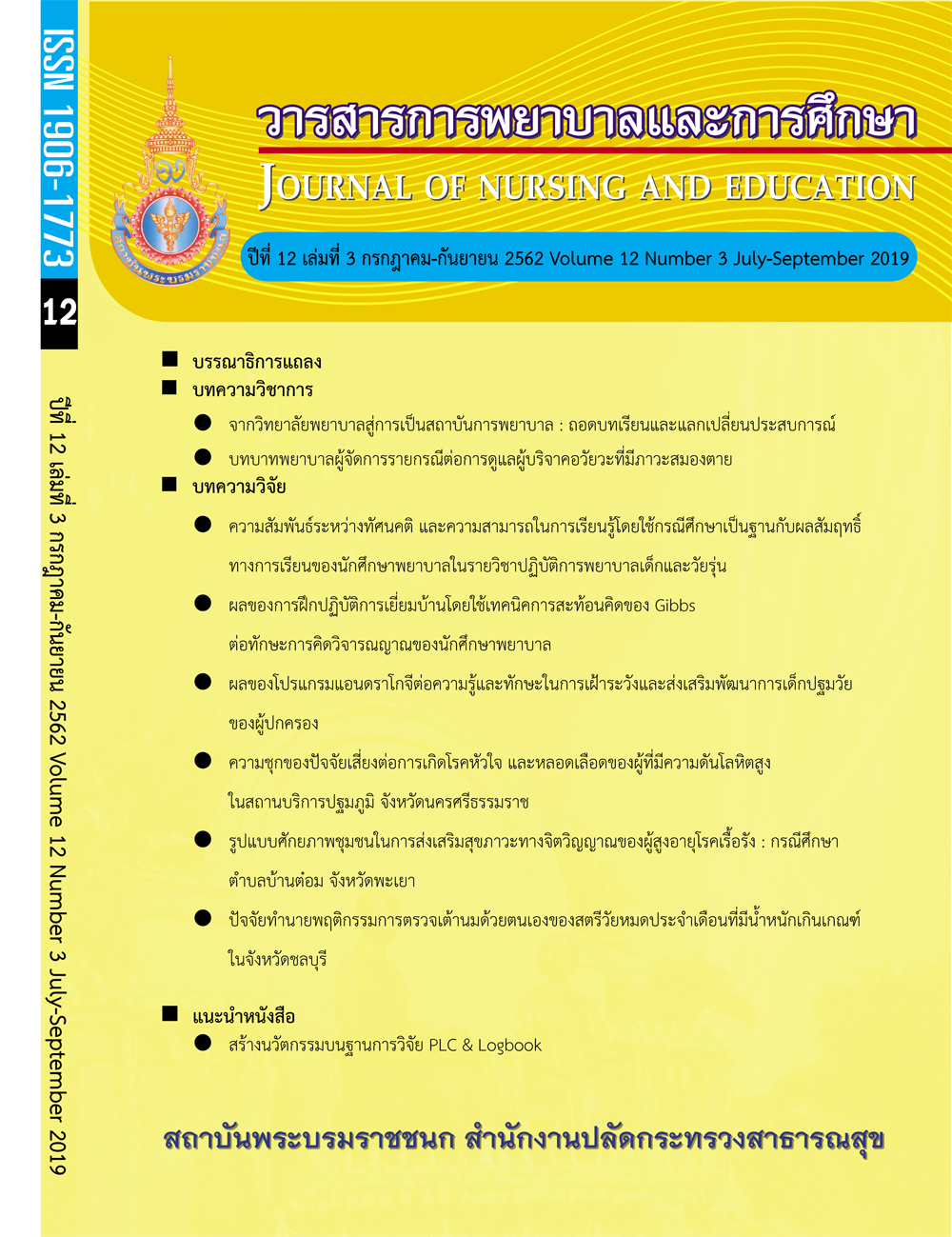ความสัมพันธ์ระหว่างทัศนคติ และความสามารถในการเรียนรู้โดยใช้กรณีศึกษาเป็นฐานกับผลสัมฤทธิ์ทางการเรียนของนักศึกษาพยาบาล ในรายวิชาปฏิบัติการพยาบาลเด็กและวัยรุ่น
The Relationship among Attitude, Case - based Learning Ability and Learning Achievement of Nursing Students in Children and Adolescents Nursing Practicum Course
คำสำคัญ:
ทัศนคติ, ความสามารถในการเรียนรู้โดยใช้กรณีศึกษาเป็นฐาน, ผลสัมฤทธิ์ทางการเรียนบทคัดย่อ
บทคัดย่อ
การวิจัยครั้งนี้เป็นการวิจัยเชิงพรรณนา (Descriptive Research) มีวัตถุประสงค์เพื่อ 1) ศึกษาทัศนคติ และความสามารถในการเรียนรู้โดยใช้กรณีศึกษาเป็นฐานของนักศึกษาพยาบาลในรายวิชาปฏิบัติการพยาบาลเด็กและวัยรุ่น และ 2) ศึกษาความสัมพันธ์ระหว่างทัศนคติและความสามารถในการเรียนรู้โดยใช้กรณีศึกษาเป็นฐานกับผลสัมฤทธิ์ทางการเรียนในรายวิชาปฏิบัติการพยาบาลเด็กและวัยรุ่น กลุ่มประชากรเป็นนักศึกษาพยาบาลศาสตร์ชั้นปีที่ 3 มหาวิทยาลัยวลัยลักษณ์ กลุ่มตัวอย่าง เป็นนักศึกษาพยาบาล ชั้นปีที่ 3 ที่ลงทะเบียนเรียนรายวิชาปฏิบัติการพยาบาลเด็กและวัยรุ่น ในภาคการศึกษาที่ 3/2560 จำนวน 82 คน เครื่องมือที่ใช้เป็นแบบสอบถามทัศนคติของนักศึกษา แบบประเมินความสามารถในการเรียนรู้โดยใช้กรณีศึกษาเป็นฐาน เป็นแบบมาตราส่วนประมาณค่า มีค่าความเที่ยงเท่ากับ 0.90 และ 0.81 ตามลำดับ เก็บข้อมูลโดยใช้แบบสอบถามทัศนคติของนักศึกษาและแบบประเมินความสามารถในการเรียนรู้โดยใช้กรณีศึกษาเป็นฐานโดยอาจารย์ประจำกลุ่มและคะแนนผลสัมฤทธิ์ทางการเรียนรายวิชาปฏิบัติเด็กและวัยรุ่นในภาพรวม วิเคราะห์ข้อมูลโดยหาค่าความถี่ ค่าเฉลี่ย ส่วนเบี่ยงเบนมาตรฐาน และค่าสัมประสิทธิ์สหสัมพันธ์ของเพียร์สัน ผลการวิจัยพบว่า
1) กลุ่มเป้าหมาย ส่วนใหญ่เป็นเพศหญิง 78 คน (ร้อยละ 95.1) อายุอยู่ในช่วง 20-23 ปี ลักษณะของโรงเรียนที่สำเร็จการศึกษาระดับมัธยมศึกษาตอนปลายส่วนใหญ่เป็นโรงเรียนประจำจังหวัด รองลงมาคือโรงเรียนประจำอำเภอ ผลการเรียนมัธยมศึกษาตอนปลายเฉลี่ย 3.55 (S.D.= .25) ผลการเรียนเฉลี่ยปัจจุบัน 2.79 (S.D.= .32)
2) คะแนนเฉลี่ยทัศนคติต่อการเรียนรู้โดยใช้กรณีศึกษาเป็นฐาน (Mean= 3.99, S.D.= .39) จากคะแนนเต็ม 5 คะแนนเฉลี่ยความสามารถในการเรียนรู้โดยใช้กรณีศึกษาเป็นฐานในภาพรวมเท่ากับ 7.93 (S.D. = .43) คะแนน (range = 7.14-9.16) จากคะแนนเต็ม 10 ความสัมพันธ์ระหว่างทัศนคติของนักศึกษากับความสามารถในการเรียนรู้โดยใช้กรณีศึกษาเป็นฐานมีความสัมพันธ์ทางบวกในระดับต่ำอย่างมีนัยสำคัญทางสถิติ (r= .24, p<.05) ความสัมพันธ์ระหว่างทัศนคติของนักศึกษากับผลสัมฤทธิ์ทางการเรียนมีความสัมพันธ์ทางบวกในระดับปานกลางอย่างมีนัยสำคัญทางสถิติ (r= .32, p<.05) ความสัมพันธ์ระหว่างความสามารถในการเรียนรู้โดยใช้กรณีศึกษาเป็นฐานกับผลสัมฤทธิ์ทางการเรียนมีความสัมพันธ์ทางบวกในระดับสูงอย่างมีนัยสำคัญทางสถิติ (r= .80, p<.001)
ผลการศึกษาแสดงให้เห็นว่า หากนักศึกษามีทัศนคติที่ดี มีศักยภาพในการเรียนรู้โดยใช้กรณีศึกษาเป็นฐานจะมีผลสัมฤทธิ์ทางการเรียนเป็นไปในทางที่ดีด้วย ดังนั้นจึงควรสนับสนุนให้มีการเรียนรู้เชิงรุกโดยใช้กรณีศึกษาเป็นฐานสำหรับนักศึกษาในระดับมหาวิทยาลัยต่อไป
References
1. Nursing Council. Institute for Nursing and Midwifery Certification Guide: For Educational Institutions which Graduates of Bachelor of Nursing Science Program. Nonthaburi: Chuttong Limited; 2013. (in Thai)
2. School of Nursing. Details of the Undergraduate Program: Bachelor of Nursing Science Program. (Curriculum Update 2012). Institute of Nursing Science Walailak University, 2012. (in Thai)
3. Williams, B. Case Based Learning- a Review of the Literature: Is there Scope for this Educational Paradigm in Prehospital Education? Emergency Medical Journal, 2005; 22: 577-581.
4. Kaddoura, M.A. Critical Thinking Skills of Nursing Students in Lecture- Based Teaching and Case– Based Learning. International Journal for the Scholarship of Teaching and Learning, 2011; 5(2): 1-18.
5. Thammakrong, A. Attitude and Behaviors of Learners Towards Active Learning Management by Integrating Content through Modern Teaching Media. Academic Journals Faculty of Humanities and Social Sciences, 2016; 12 (1): 124-146. (in Thai)
6. Hansen, W. F., Ferquson, K.J., Sipe, C.S., Sorosky, J. Attitudes of Faculty and Students toward Case-Based Learning in the Third-Year Obstetrics and Gynecology Clerkship. Am J Obstet Gynecol, 2005; 192(2): 644-647.
7. Bloom, B.S. Human Characteristics and School Learning. New York: McGraw-Hill, 1982.
8. Flynn, A and Klein, J. The Influence of Discussion Groups in a Case-Based Learning Environment. Educational Technology Research & Development, 2001; 49(3) :71-86.
9. Gordon, M. Nursing Diagnosis: Process and Application. New York: McGraw-Hill, 1994.
10. Ward, R. Active, Collaborative and Case-Based Learning with Computer-Based Case
Scenarios. Computer in Education,1998; 30(1): 103-110.
11.Purananon, P. and Krirkulthorn, K. Ability and Attitude in Nursing Practice Using Empirical Evidence of Nursing Students. Journal of Nursing Science, 2011; 29(1): 45-52. (in Thai)
12. Yoo, M.S. and Park, J.H. Effect of Case-Based Learning on the Development of Graduate nurses’ Problem-Solving Ability. Nurse Education Today, 2014; 34: 47-51.
13. Khaemmanee, T. Teaching science: Knowledge for Effective Learning Process
Management. Bangkok: Chulalongkorn University Publishing House, 2011. (in Thai)
14. Kusol, K., Wongnart, S., Jaraeprapal, U. Attitude and Achievement of Students towards Teaching and Learning Using Problem- Based Learning. Songklanagarind Journal of Nursing, 2007; 28(3): 29-40. (in Thai)
15. Jesus, A., Gomes, M.J., Cruz, A. A Case- Based Learning Model in Therapeutics. Education, (2012); 3(4): 1-12.
16. Blackmon, M., Hong, Y., Choi, I. Case- Based Learning. Retrieved [online].(cited 2007) Available from http: //epltt.coe.uga.edu/index.php.
17. Kaewprasert, V. The Study of Analytical Results and Learning Achievement with E-Learning by Using Case-Based Learning of Undergraduate Students Department of Education, Veridian E-Journal, 2014; 7(2): 947-959. (in Thai)
18. Ray, J. and Datta, A. Case Based Learning in Undergraduate Pathology A study of asses its efficacy and Acceptability as Teaching Learning Tool. International Archives of Integrated Medicine, 2016; 3(6): 93-100.
19. Apichatboonchok, S. Development of a Case-Based Learning Model and The Ability to Evaluate Breathing Problems of Students in NICU. Vajira Medical Journal, 2015; 59(3): 25-34. (in Thai)
20. Klahan, R. Factors Affecting Practical Learning Achievement of Third Year nursing Students at Srinakharinwirot University. Journal of the Royal Thai Army Nurses, 2014; 15(3): 412-420. (in Thai)






